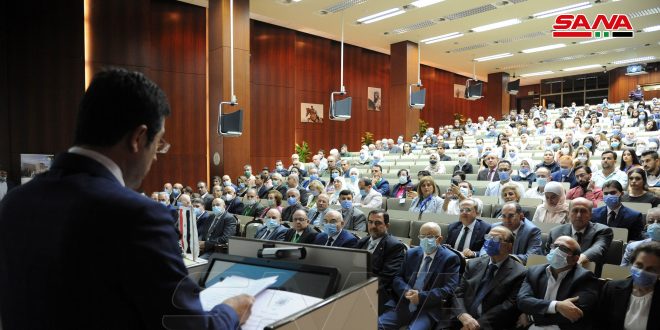The thirteenth scientific conference of Damascus Physicians Syndicate sheds light on the latest developments in medical sciences regarding the management of Coronavirus, interventional radiology, digestive diseases, glands and gynecology, cardiovascular diseases, and the prospects for using stem cells.
The conference, which kicked off today at Al-Assad University Hospital in Damascus, includes 43 scientific sessions with the participation of more than 500 doctors.
In a statement to reporters during the opening, the Minister of Health, Dr. Hassan Al-Ghobash referred to the Ministry’s permanent partnership with the medical unions and to its support for the scientific conferences, in a way that contributes to the development of the health sector, providing optimal service to the patient, introducing the latest developments in medical sciences, and exchanging experiences between medical workers at the local and global levels.
The Minister of Higher Education and Scientific Research, Dr. Bassam Ibrahim, underlined the permanent cooperation and integration between the work of higher education and health hospitals with the aim of serving the health sector in general, especially the continuous coordination between the two sides during the spread of the Coronavirus in terms of securing isolation departments and medical supplies and equipment.
The head of Damascus Physicians Syndicate, Dr. Imad Saadeh, stated that the conference includes advanced medical topics in various specializations and their applications in many diseases, pointing out that it is an opportunity to exchange experiences and information and increase the doctors’ expertise.
Director of Al-Mowasat Hospital, Dr. Essam Al-Amin, asserted that the conference deals with the latest general medical developments, brings together medical and scientific figures in Syria, and discusses the development of academic work and the development of the medical sector in general.
Dr. Abdullah Hatahet, head of the Association of Radiologists, noted that the session deals with the developments of interventional radiology, its role in surgical operations, and the method of introducing it into medical treatments without posing a risk to the patient’s life or causing injuries or the need for general anesthesia.
On the sidelines of the conference, 11 male and female graduate students and resident physicians in the hospitals of the Ministries of Higher Education and Health and Military Medical Services who published a number of scientific researches in refereed medical journals were honored.
The honored postgraduates highlighted the importance of honoring in encouraging students to motivate and work on research.
It is noteworthy that the conference will continue until the first of October and is accompanied by a specialized medical exhibition of the latest medical equipment and modern pharmaceutical industries.
Inas Abdulkareem

